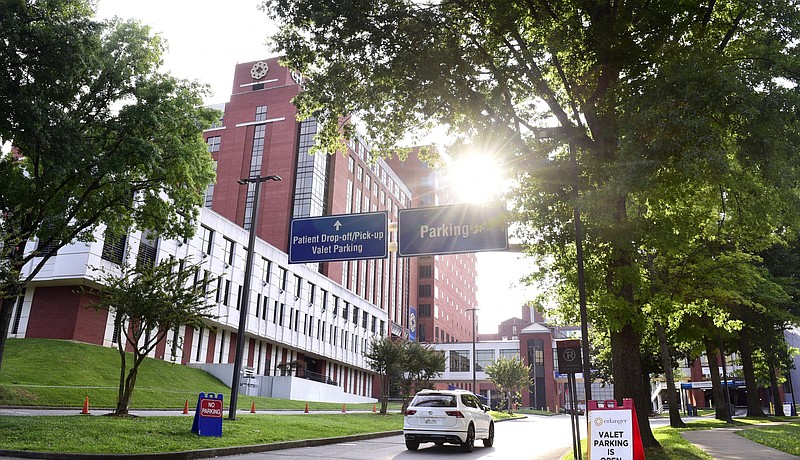Tennessee hospitals may soon be forced to allow visitors for coronavirus patients pending Gov. Bill Lee signing a bill passed by the Tennessee General Assembly in its recent special session.
The bill states "a hospital shall not restrict a patient from having at least one (1) family member present with the patient during the stay in the hospital as long as the family member tests negative for COVID-19 and is not exhibiting symptoms of COVID-19 or another virus or communicable disease."
But there appears to be a difference of opinion between the offices of Republican House Speaker Cameron Sexton and Republican Lt. Gov. Randy McNally, the Senate speaker, on how to implement the new visitation requirement - which took the Tennessee Hospital Association by surprise when it was added at the tail end of the session.
"We do have some concerns regarding a late addition to the legislation dealing with visitation for COVID patients and how that provision will ultimately be implemented," Dr. Wendy Long, president and CEO of the Tennessee Hospital Association, said in a statement.
"We have reached out to leadership and members of the General Assembly and they have expressed to us, as well as in committee meetings, that the legislative intent was for end-of-life scenarios. We are already in discussion with the House and Senate to better clarify their intent when they reconvene in regular session in January."
In an email, Sexton spokesman Doug Kufner said based on discussions with committee members and the bill's sponsor, "the intent of the legislation was to help families support their loved ones who are nearing or in end-of-life scenarios."
However, McNally spokesman Adam Kleinheider in an email called the care, support and guidance that can be provided by a family member or friend "invaluable."
"Hospitalization for COVID-19 is obviously an extremely serious event for anyone. Lt. Gov. McNally intended exactly what the bill says," Kleinheider said. "No one should have to face a potentially life-threatening scenario alone.
"If that person is tested and symptom-free, there is no reason they should not be able to care for their loved one in their time of need," he said.
While Parkridge Health System facilities in Chattanooga already permit COVID-19 patients to have one visitor, according to a hospital spokesperson, Chattanooga's other major health systems only do so in end-of-life situations or not at all.
CHI Memorial spokesperson Karen Long said in an email that patients with active COVID-19 infections are not allowed visitors except for end-of-life.
"If patients remain in the hospital after the infectious period, regular visitation applies," Long said. For non-coronavirus patients, the hospital currently allows one designated visitor per patient during the day, and one visitor is allowed to stay overnight.
If the law is passed, Long said, "We will develop a process to comply."
Erlanger Health System does not currently allow visitors in the COVID-19 units for its Tennessee-based hospitals but recently began doing so at its Murphy, North Carolina, facility after the state passed its own visitation requirement.
"We routinely review our visitation policy, always keeping in mind our responsibility to ensure patients, our staff, visitors and community are safe. We recognize the importance for patients to have visitors, therefore, we will continue to increase visitation as the circumstances support and provide a safe environment for everyone," Erlanger spokesperson Blaine Kelley said in an emailed statement.
"The decision to limit visitors was made after thoughtful discussion, taking into consideration what other health systems have implemented to prevent the spread of COVID-19. Due to the changing nature of COVID-19's presence in Eastern Tennessee, North Georgia and Western North Carolina, this policy will remain in place until further notice," Kelley said, adding that the policy is "determined by a multi-disciplinary group including physicians, emergency management and infection prevention specialists who discuss the best and safest approach based on current transmission rates, hospitalizations, and other concerns to ensure a safe environment."
So far, the move to allow visitors at the Murphy hospital has gone smoothly, Kelley said.
"Both patients and families are appreciative of the changes," Kelley said.
Throughout much of the pandemic, visitors have been barred from seeing COVID-19 patients due to the serious and highly contagious nature of the coronavirus.
In the early days, hospitals' personal protective equipment supply was too limited to spare for the general public, but many no-visitor policies remain in effect over concern that visitors will increase infection risk.
As a result, most COVID-19 patients die with health care workers rather than family by their side, which has exacerbated the grieving process for both families and clinicians.
Contact Elizabeth Fite at efite@timesfreepress.com or follow her on Twitter @ecfite.
Staff writer Andy Sher contributed to this story.
